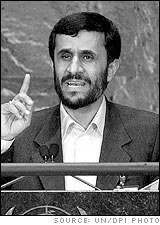2012 World News: Iran

Advances in Nuclear Program Lead to Additional Sanctions and Increased Tension with Israel
by Beth Rowen
Tension between Iran and Israel intensified in early 2012 as Iran continued to make progress on its nuclear weapons program, prompting Israeli prime minister Benjamin Netanyahu to consider a preemptive strike against its longtime enemy. The international community used sanctions and diplomacy in an attempt to convince Iran to halt its march to becoming a nuclear-armed nation to little avail. For much of the year there was serious concern that Netanyahu would act unilaterally to thwart Iran's nuclear ambitions. Netanyahu's threats were not taken lightly, especially since Israel has launched preemptive strikes in the past: Israel attacked a nuclear reactor in Iraq in 1981 and Israeli jets fired on a partially built nuclear reactor deep inside Syria in 2007. In Aug. 2012, the International Atomic Energy Agency reported that while economic sanctions have hurt Iran, they have not slowed the country's nuclear program. In fact, the report found that Iran's nuclear program had progressed even faster than anticipated. The report validated Netanyahu's suspicion that Iran's nuclear program has continued to move at full speed despite the sanctions and diplomatic isolation. The agency's report also confirmed that 75% of the nuclear centrifuges needed for an underground site had been installed at a new facility. Netanyahu indicated that Iran was getting close to crossing the "red line" and that Israel had to formulate a timeline to thwart Iran's nuclear ambitions. In late September in an address to the UN General Assembly, Netanyahu calmed fears that a preemptive attack was imminent. He said he believed Iran would not have the technology to enrich uranium until at least the spring of 2013 and therefore there was time for diplomacy to derail Iran's nuclear program. Sanctions Take Their Toll on Iran's EconomyIn June 2012, the European Union imposed an embargo on Iranian oil in an effort to persuade Iran to halt uranium enrichment. In response, Iran threatened to close the Strait of Hormuz, which would seriously impede delivery of oil to areas outside the Persian Gulf and sharply increase prices. At the same time the U.S. said it would impose financial penalties on countries that buy Iranian oil. The EU followed those sanctions with another round in October that targeted the banking, shipping, and other industrial sectors. The sanctions have resulted in a weak currency, inflation, and a drop in manufacturing and oil production. The economic woes have caused discord among the populace that has seen rising prices and sharply diminished purchasing power. As Iran's economy continued to crumble under the weight of increasingly stringent economic sanctions—the value of the rial fell by more than 40% in one week in early October—Iran and the U.S. agreed in October to engage in bilateral talks about Iran's nuclear weapons program. However, no talks had occurred by mid-December. |
- More from 2012 News of the World









